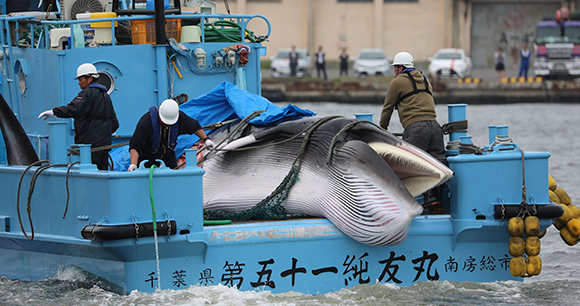
Washington, DC–Japan faces international criticism and risks legal challenges as it launches a government-subsidized commercial whaling program to kill 383 whales this year with no international oversight.
On June 30, Japan withdrew from the International Whaling Commission (IWC), an organization it joined nearly 70 years ago. In recent decades, Japan made scores of attempts to overturn the IWC’s longstanding international ban on commercial whaling. Now, having failed in these attempts, it will pursue commercial whaling from outside the IWC.
New whaling quotas meant to yield approximately 2,000 metric tons of meat were issued today. For six months, starting July 1, five small vessels will hunt minke and Bryde’s whales in Japan’s coastal waters. At the same time, its aging industrial-scale factory ship will depart with a pair of harpooner boats from the whaling port of Shimonoseki to hunt offshore within the 200 mile limit of Japan’s exclusive economic zone (EEZ). This combined coastal/offshore fleet will hunt up to 171 minke whales, 187 Bryde’s whales, and 25 sei whales (the third largest animal on the planet and an endangered species).
For years, the Japanese government commissioned these whaling vessels to kill these species—ostensibly for research—in Antarctica and the North Pacific and then sell the meat onto the domestic market. The new quotas, which are lower than the research quotas, are temporary while the government assesses the operation, in particular the commercial marketability of the whale meat.
Demand for whale meat in Japan has fallen 99 percent since the 1960s, to an average of just a handful of grams per person per year, and its whaling industry employs only a few hundred people. Nevertheless, Japan is determined to prove to the world that whaling can be lucrative, even as it continues to provide the significant subsidies required to keep its whaling industry afloat.
The government has not ruled out taking other species or hunting in international waters in the future. This raises concern that Japan may defy another international treaty, the Convention on International Trade in Endangered Species of Wild Fauna and Flora (CITES), which prohibits the landing of meat from protected whales killed on the high seas. The CITES Standing Committee recently declared that Japan’s sale of meat from North Pacific sei whales hunted beyond its EEZ is illegal. Next month, to avoid potential trade sanctions, Japan must demonstrate to the committee that its plans for a new North Pacific sei whale hunt comply with the treaty.
There is also the specter of a separate legal challenge, under the United Nations Convention on the Law of the Sea, against Japan’s new whaling. In the meantime, Japan’s decision to hunt outside of international control has triggered global condemnation, including a letter from more than 100 animal protection and conservation groups to leaders at the recent G20 summit in Osaka, Japan, calling for a strong diplomatic response. Demonstrations against Japan’s resumption of commercial whaling also occurred outside the Japanese Embassy in London and elsewhere.
AWI is concerned that, although Japan may initially take fewer whales under its new whaling regime, its departure from the IWC means that those hunts will not be subject to international scrutiny to monitor whether they are sustainable, humane, and not in excess of established quotas. In addition, the ongoing subsidy of the operation means that Japan's whaling is likely to last longer and take more whales than it would if true market forces were allowed to apply.
“Commercial whaling has no place in the 21st century. It is economically, politically, legally, and scientifically indefensible,” said Cathy Liss, president of AWI. “Such hunts aren’t necessary to provide food or other resources for humans, and are inhumane and impossible to regulate, especially when conducted far from shore.”
Read more about AWI’s work to end whaling here: https://awionline.org/content/whaling.
Sydney Hearst, (202) 446-2128, [email protected]